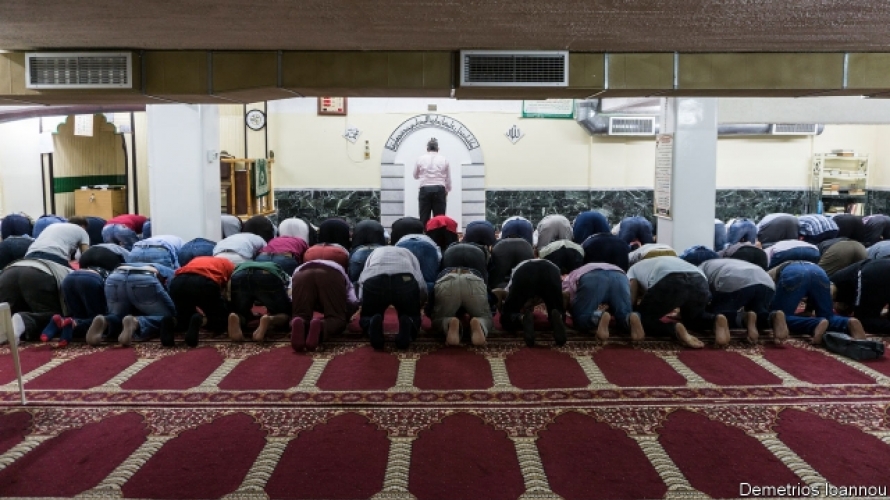The strange social reality of Islam in Greece
The Economist / by D.I. and ERASMUS

ON A baking-hot Friday afternoon in the dusty Athenian district of Neos Kosmos, a cheerful assortment of (mostly male) worshippers greet one another in Arabic, Greek and other languages, and enter a nondescript building in a side-street. They descend a steep set of stairs, perform their ablutions, and make their way into a large undergound space, pleasantly carpeted, but with ventilation pipes half-hiding the low ceiling. Soon the imam is leading them in prayer and prostration, and pronouncing a khutba or sermon. Despite the makeshift premises, this has the feeling of a well-organised and confident community. Worshippers include sportsmen from well-known clubs and businessmen using nearby hotels.
This slice of Athenian reality is a reminder that, although theory and practice are both words with Greek roots, they do not always march in step in this part of the world. In constitutional theory, Greece is a country whose prevailing religion, followed by an overwhelming majority, is Orthodox Christianity. With an important exception (the region adjacent to the land border with Turkey), most of the country’s Muslims were transferred to Turkey under an agreed Christian-Muslim population exchange in 1923. There are two small historic mosques in the oldest part of Athens, but they have not been used for regular worship since Ottoman times.
The real situation, however, is different. In the region around Athens and its port of Piraeus, the de facto Muslim population is thought to be several hundred thousand, but its precise size is anyone’s guess. They range from well-established families of Arab origin from Egypt and the Levant whose first generation arrived in the 1970s to very recent migrants from Afghanistan, South Asia and west Africa.
On the face of things, that makes all the more urgent a project to which successive Greek governments have been committed since 1980: the construction of an “official mosque” which would signal the state’s recognition that the world’s second-largest religion flourishes in its capital. After going through many permutations, an effort to build a mosque in downtown Athens with state funds looks fairly close to completion. Yet the final stages seem to slip further and further into the future. In what could be the last bureaucratic stage, or yet another delaying tactic, the authorities have invited the public to comment on the details of a draft decree which lays down the mosque’s management structure, giving the state a controlling interest.
Greece’s left-leaning government, led by Prime Minister Alexis Tsipras, seems genuinely keen to press ahead with the opening of a grand new place of Islamic worship, for which a construction contract was signed in October 2016. Yiannis Amanatides, the deputy foreign minister, has repeatedly said that the project’s completion with state funds will bring an end to an anomaly (the absence of formal recognition for Islam in Athens) which has caused some awkwardness in Hellenic relations with Muslim countries. The project does not involve building from scratch; a former naval premises in the grimy district of Votanikos is being refitted. The specifications call for a place of Islamic worship for 350 men and 50 women. Some dilapidated structures around the building will be removed to make way for other Muslim facilities.
Various impediments, including legal challenges and protests by ultra-rightist groups, seemed to have been overcome as the necessary laws were voted through parliament in 2016 and early 2017. But one big political problem remains: opposition from the conservative nationalist party, known as Independent Greeks or ANEL, which shares power with the ruling leftists of the Syriza movement. The parliamentarians of ANEL have voted against the laws and amendments authorising the mosque, and leaders of the Athenian Muslim community say they doubt whether the official mosque will be formally opened as long as ANEL is a junior partner in government.
That leaves the great majority of the region’s Muslims operating in the legal grey area of informal worship spaces, often in basements, converted garages or modest apartments which are technically just private homes. A senior government official says the intention is to regularise these places of prayer by inviting them to apply for licences as religious premises, on the same terms as are offered to any other religious community. There should be no problem, according to the official, as long as the communities respect building and safety regulations. Six such licences have been issued to Muslim groups so far, including the one in Neos Kosmos. Here again, theory and practice may diverge. Some Athenian Muslims are prepared to give this process a chance; others say they are pessimistic about obtaining many licences as long as the Greek Orthodox church retains a de facto veto on the allocation of space for religious purposes.
Naim El-Ghandour, the Egyptian-born president of the Muslim Association of Greece, says he has repeatedly made the case that the Hellenic state’s interest would be served by giving Islam the legal status it merits. Already, he says, long-established Muslims like himself have a mutually beneficial relationship with the authorities. The police appreciate the job done by community leaders who keep an eye on any sign of extremism popping up in the city’s fast-mutating Muslim scene. But as new cohorts of Muslims grow up in Athens, undergoing Greek education and military service, they are less likely in his view to be content with living in legal limbo. As Mr Ghandour puts it: “The second generation is beginning to ask, why? I’m a Greek subject, an alumnus of Greek schools, I have no other country…but when I pray I have to go a basement, while my neighbour can go to a church.”
All that might sound logical, but Greece is a country where informal arrangements, with all their pros and cons, can continue almost indefinitely when the price of changing them looks too high.